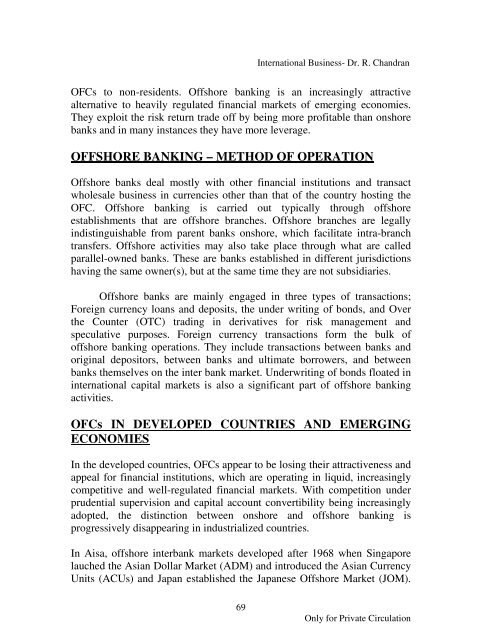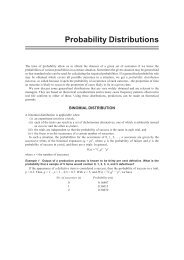International-Business-Dr-R-Chandran-E-book
International-Business-Dr-R-Chandran-E-book
International-Business-Dr-R-Chandran-E-book
You also want an ePaper? Increase the reach of your titles
YUMPU automatically turns print PDFs into web optimized ePapers that Google loves.
69<br />
<strong>International</strong> <strong>Business</strong>- <strong>Dr</strong>. R. <strong>Chandran</strong><br />
OFCs to non-residents. Offshore banking is an increasingly attractive<br />
alternative to heavily regulated financial markets of emerging economies.<br />
They exploit the risk return trade off by being more profitable than onshore<br />
banks and in many instances they have more leverage.<br />
OFFSHORE BANKING – METHOD OF OPERATION<br />
Offshore banks deal mostly with other financial institutions and transact<br />
wholesale business in currencies other than that of the country hosting the<br />
OFC. Offshore banking is carried out typically through offshore<br />
establishments that are offshore branches. Offshore branches are legally<br />
indistinguishable from parent banks onshore, which facilitate intra-branch<br />
transfers. Offshore activities may also take place through what are called<br />
parallel-owned banks. These are banks established in different jurisdictions<br />
having the same owner(s), but at the same time they are not subsidiaries.<br />
Offshore banks are mainly engaged in three types of transactions;<br />
Foreign currency loans and deposits, the under writing of bonds, and Over<br />
the Counter (OTC) trading in derivatives for risk management and<br />
speculative purposes. Foreign currency transactions form the bulk of<br />
offshore banking operations. They include transactions between banks and<br />
original depositors, between banks and ultimate borrowers, and between<br />
banks themselves on the inter bank market. Underwriting of bonds floated in<br />
international capital markets is also a significant part of offshore banking<br />
activities.<br />
OFCs IN DEVELOPED COUNTRIES AND EMERGING<br />
ECONOMIES<br />
In the developed countries, OFCs appear to be losing their attractiveness and<br />
appeal for financial institutions, which are operating in liquid, increasingly<br />
competitive and well-regulated financial markets. With competition under<br />
prudential supervision and capital account convertibility being increasingly<br />
adopted, the distinction between onshore and offshore banking is<br />
progressively disappearing in industrialized countries.<br />
In Aisa, offshore interbank markets developed after 1968 when Singapore<br />
lauched the Asian Dollar Market (ADM) and introduced the Asian Currency<br />
Units (ACUs) and Japan established the Japanese Offshore Market (JOM).<br />
Only for Private Circulation





